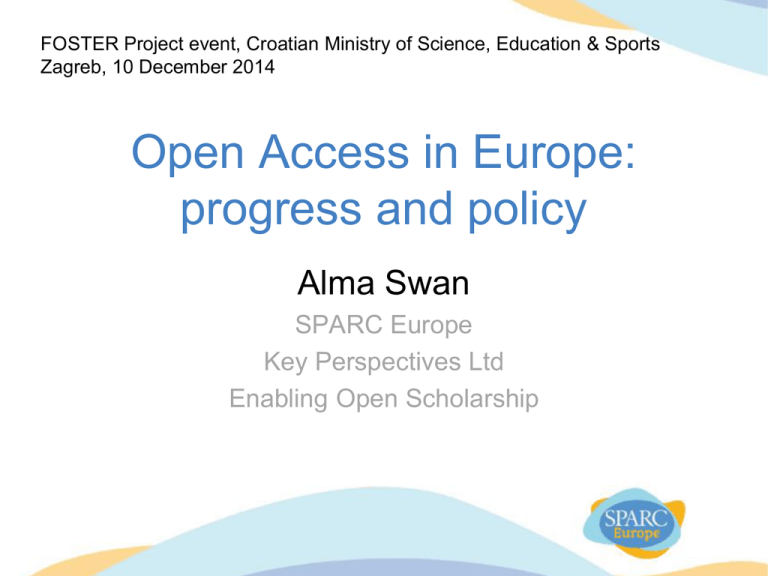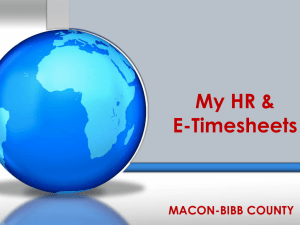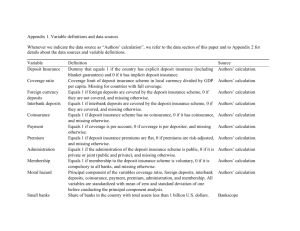Original
advertisement

FOSTER Project event, Croatian Ministry of Science, Education & Sports Zagreb, 10 December 2014 Open Access in Europe: progress and policy Alma Swan SPARC Europe Key Perspectives Ltd Enabling Open Scholarship Shape of this presentation • Some context • OA benefits for authors, institutions and funders • The policy picture • Policy formulation Some context: progress of Open Access Why so low after > 15 years? • • • • • Lack of awareness Lack of understanding Overdose of misunderstandings Fear of repercussions Reward systems in academia entrench conservative behaviour • Glacial pace of academic adoption of the Web What’s in it for authors? Author advantages from Open Access • Visibility • Usage • Impact • Personal profiling and marketing Visibility An author’s own testimony on open access visibility “Self-archiving in the PhilSci Archive has given instant world-wide visibility to my work. As a result, I was invited to submit papers to refereed international conferences/journals and got them accepted.” Usage University of Liege repository: authors deposit Individual article usage: annual levels Individual article usage: monthly levels University of Salford: USIR c9000 records Individual authors’ usage Individual authors’ usage Impact Citation impact Range = 36%-200% (Data: Stevan Harnad and co-workers) What OA means for a researcher’s citation impact Top authors (by download) Ray Frost’s impact Top authors (by download) Martin Skitmore (Urban Design) Engineering 20 18 16 Citations 14 12 OA Non-OA 10 8 6 4 2 0 2000 2001 2002 2003 2004 2005 2006 2007 2008 Data: Gargouri & Harnad, 2010 Citations Clinical medicine 50 45 40 35 30 25 20 15 10 5 0 OA Non-OA 2000 2001 2002 2003 2004 2005 2006 2007 2008 Data: Gargouri & Harnad, 2010 Citations Social science 18 16 14 12 10 8 6 4 2 0 OA Non-OA 2000 2001 2002 2003 2004 2005 2006 2007 2008 Data: Gargouri & Harnad, 2010 Profiling and marketing Melissa Terras To summarise … • • • • More views More downloads More tweets More citations (see SPARC Europe site for list of studies and summary of findings) For institutions? “The case for Open Access within a university is not simply political or economic or professional. It needs to rest in the notion of what a university is and what it should be .... It is central to the university’s position in the public space” Professor Martin Hall, Vice Chancellor of the University of Salford, UK Institutional and funder advantages from Open Access • Visibility, usage • Impact • Profiling and marketing • Outreach to the public: demonstrating social return • Economic benefits • Institutional management information “I am asked how many articles my researchers publish each year, and I have to say ‘I have no idea!’. It is like being the manager of a car factory and not knowing what models of car, and how many cars, my factory produces.” Professor Bernard Rentier, Rector, University of Liege, Belgium, explaining one of the reasons why he has built an institutional Open Access repository and introduced a mandatory policy on Open Access Outreach: the public • • • • • • Independent researchers Education sector Professional community Practitioner community Interested ‘lay’ public Business sector, including innovative SMEs PubMed Central • 2 million full-text articles • c500,000 unique users per day: – – – – 25% universities 18% government and others 40% citizens 17% companies Economic implications in Denmark • Access to research articles is very/extremely important: 48% • 79% have access difficulties • Difficulties in searching/accessing articles: €73m per year to researchers in Danish firms • Average delay to product or process development without access to academic research: 2.2 years • For new products: €4.8 million per company Houghton, Swan & Brown, 2011 EU CIS studies Total Research Income: QUT and sector 30 120 25 100 20 80 % increase 140 % increase 35 15 10 5 0 60 40 20 0 2004 2005 All univs 2006 2007 QUT 2003-2007 All univs QUT Data: Tom Cochrane, Deputy Vice-Chancellor, QUT Senior Lecturer, Design, QUT “Just last week, the General Manager of Sustainable Development from an Australian rural industry called me – based on reading one of my research papers in ePrints. He loved what he read ..... and we are now in discussion about how we can help them measure their industry’s social impacts.” For research funders? Funder benefits • • • • • Better science More efficient research process Research impact, monitoring, management Outreach to new users Economic benefits The Open Access policy picture Policies: worldwide numbers Current global picture: Open Access policies Region Policies Europe 356 North America 146 Central & South America 35 Africa 11 Asia 65 Oceania 38 Total 651 Data: ROARMAP (Registry of Open Access Policies and Mandates) http://roarmap.eprints.org/ Open Access policies worldwide Oceania Asia Africa Central & South America Europe North America Policy formulation • Several essential elements • Mandatory • Deposit immediately (at acceptance for publication) • Deposit required, but OA itself may come later • Connect deposit with research assessment The effect of a mandatory policy Current global picture: Open Access mandates Region Mandates Europe 203 North America 70 Central & South America 17 Africa 6 Asia 32 Oceania 18 Total 346 Open Access mandates worldwide Asia Oceania Africa Central & South America Europe North America ‘Green’ Open Access: Time of deposit When deposit is required Number % Acceptance date 52 15 Publication date 64 13 By the end of a defined, permitted embargo period 33 9 When the publisher permits 5 5 Not mentioned 143 41 Other 38 11 ‘Green’ Open Access: Time of deposit 0 Acceptance date Publication date Defined embargo When publisher permits Not specified Other 10 20 % 30 40 50 ‘Green’ Open Access: Time of deposit 0 Acceptance date Publication date Defined embargo When publisher permits Not specified Other 10 20 % 30 40 50 Link to research evaluation and assessment Region Number of policies linked to research assessment % of total policies linked to research assessment Europe 5 36 North America 4 29 Central / South America 0 0 Africa 0 0 Asia 5 36 Oceania 0 0 All 14 100% ‘Gold’ Open Access • No requirements for ‘Gold’ Open Access • Some funder policies emphasise or prefer it ‘Gold’ Open Access: policy provisions Gold Open Access conditions % all % European ‘Gold’ Open Access costs allowable from grant 3.3 3.9 Funder provides additional funds for ‘Gold” OA costs 2.7 4.8 Institution has a ‘Gold’ Open Access fund 9.6 8.1 ‘Gold’ Open Access: policy provisions % 0 5 10 15 Costs payable from grant Additional funding for 'Gold' OA costs Intitution has 'Gold' OA fund All Europe Policy effectiveness: Universite de Liege • • • • • • • • Must deposit At acceptance In the institutional repository (ORBi) May respect publisher embargoes Deposit linked to performance assessment Deposit rate is now 87% The highest in the world Second is U.Minho (Portugal): 69% (rising) University of Liege repository: authors deposit H2020 and Open Access • Mandatory for peer-reviewed publications • ‘Green’ OA mandate (repositories) – Publish as normal in subscription-based journals – Place author’s copy in OA repository – Deposit this at acceptance for publication • ‘Gold’ OA: Permits payments from grants for OA journal publication • Mute on monographs • Definite on data, announcing an open data pilot for H2020 OA infrastructure for EU research Authors OpenAIRE Institutional repositories Readers Google, etc Recommendation to Member States (July 2012) • Member States develop policies on OA • Consistency between H2020 policy and those of MS • Coordination of MS at EU level • Reporting at MS and EU level • Multi-stakeholder dialogue to be established PASTEUR4OA project • Policy Alignment Strategies for European Union Research • Promoting policy development • Promoting good policy development: – – – – Mandatory Deposit in repository At the time of acceptance for publication Link deposit to performance evaluation • Developing a network of national expert organisations to encourage and advise policymakers Policy alignment • Irons out dissonances for researchers working in interdisciplinary areas or on international teams • Supports EU harmonisation agenda for ERA (research conditions, researcher mobility, gender issues, knowledge sharing, etc) • Key issue in changing author practices and norms • Allows generic infrastructural services to be established in support of policy Critical policy elements • • • • • Must deposit At acceptance for publication In institutional repositories May respect publisher embargoes Deposit linked to performance assessment Thank you for listening almaswan3@gmail.com www.sparceurope.org www.openscholarship.org






